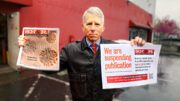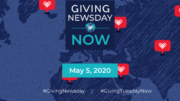
Comfort Eagle
My mantra as a journalist has long been Finley Peter Dunne’s “Comfort the afflicted, and afflict the comfortable,” a fairly straight-forward guideline for someone on the poverty beat.
What this quote means is that journalists are supposed to tirelessly (and often adversarily) question those who are in power, while trying to ensure that society’s silent victims have their voices heard. This sentiment runs across the journalistic spectrum – from war reporting to town hall coverage.
With that in mind, I assume you understand why I disagreed so strongly with our August 15 editorial saying that the NSA’s surveillance practices are necessary for the American people’s safety.
The opinion begins with a hypothetical situation in which terrorists kill hundreds of Americans after planning with one another for months through phone calls and emails which the NSA was not allowed to track. “It’s safe to say the public outrage would dwarf the current outcry over the NSA surveillance program,” it says.
It goes on to argue what is, in essence, the US government’s line of discourse, saying that the NSA merely collects metadata to connect the dots, that no one is “wiretapping” and that no calls or emails are being surveilled without court approval.
These above arguments have, to varying degrees, been debunked over the summer by reporting from news organizations in possession of the thousands of NSA documents leaked by Edward Snowden (a privilege we at SN&R, unfortunately, do not have).
In fact, the NSA’s reach far outstrips what we originally expected. The FISA courts almost never deny requests to surveille. The NSA breaks privacy guidelines thousands of times per year, sometimes on purpose (these stats come from just one NSA location). The NSA enjoys almost complete access to all of the western world’s main tech and communications companies – Google, Facebook, Verizon [you get the idea] – and has forbid them by penalty of jailtime from speaking out about it [also see: Lavabit]. And now we find the NSA has massaged the encryption industry so they can access a plurality of the world’s encrypted files.
When we add in the Obama administration’s attacks on journalists and whistleblowers, I find myself scratching my head. On the one hand, we have the government attacking journalists’ very livelihood, and on the other we have journalists defending that government when it uses those practices on the American people – even as officials lie to them.
In On Heroes and Hero Worship, Thomas Carlyle describes eighteenth century Irish statesman Edmund Burke’s feelings on the press: There were Three Estates in Parliament; but, in the Reporters’ Gallery yonder, there sat a Fourth Estate more important far than they all.
The importance of that Fourth Estate, as you may have guessed, was to hold those in Parliament accountable. I hope that remains true today.




